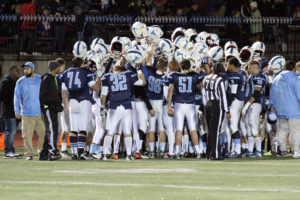 (Updated at 3:55 p.m.) Arlington Public Schools announced this week that it would be replacing its football helmets with new equipment designed to more effectively prevent concussions.
(Updated at 3:55 p.m.) Arlington Public Schools announced this week that it would be replacing its football helmets with new equipment designed to more effectively prevent concussions.
APS purchased more than 325 Riddell Revolution Speed helmets this summer with carryover superintendent funds from last year’s budget, APS Supervisor for Health, Physical Education and Athletics Debbie DeFranco told ARLnow.com. The helmets all received five-star ratings from a new Virginia Tech Helmet Rating System, which grades helmets on safety from one (lowest) to five (highest) stars.
The helmets will replace current helmets that graded between two- and four-stars, said DeFranco, who added that all helmets APS has used in football practices and games had previously passed the National Operating Committee on Standards for Athletic Equipment tests for safety.
“We were really looking for the best our students could get,” DeFranco said. “Because safety is paramount in everything we do, [Superintendent Patrick Murphy] said when the study came out, ‘let’s see what we can do.’ We realized how many were not five-rated under the system, and replaced those with five-star rated helmets.”
The helmets are also adaptable to future technology, including in-development sensors to detect impact to the head. The sensors, if they are implemented in the future, would be able to measure hits that don’t necessarily result in concussions, but could still have negative impacts on a developing brain.
Head injuries in football have come under scrutiny in recent years after a spate of high-profile suicides among former NFL players and a multi-million dollar lawsuit against the NFL by former players accusing the league of covering up the long-term impacts of brain injuries. High school football players have also suffered, including some who have died on the field, from the impacts of the repeated blows to the head that are commonplace in football.
DeFranco said all athletes undergo “baseline testing” before the season starts to determine their cognitive function. That way, when they suffer an apparent head injury, trainers can measure their brain functionality and compare it to before the injury occurred.
“We have a series of protocols that are aligned with the state law and international standards for returning to play,” DeFranco said. “We make sure they’re seen by someone who’s an expert in brain injuries. Fortunately, because of the media notoriety [concussions have received], a lot of the pediatricians have gone ahead and gotten training in the field.”
“It’s hard because kids want to play, they want to practice, they don’t want to sit out and rest,” DeFranco continued. “We try to educate their peers to tell them they need to rest, because it can have residual effects. There have been unfortunate tragedies where kids can come back too soon where it has ended tragically. We want to avoid them at all costs.”
Former football player Chris Nowinski, a concussion expert and victim of post-concussion syndrome, will be training all APS coaches in a lecture that parents and athletes are encouraged to attend. Nowinski, co-founder of the Sports Legacy Institute, will speak at Wakefield High School on Monday, Sept. 15, at 7:00 p.m.
File photo

